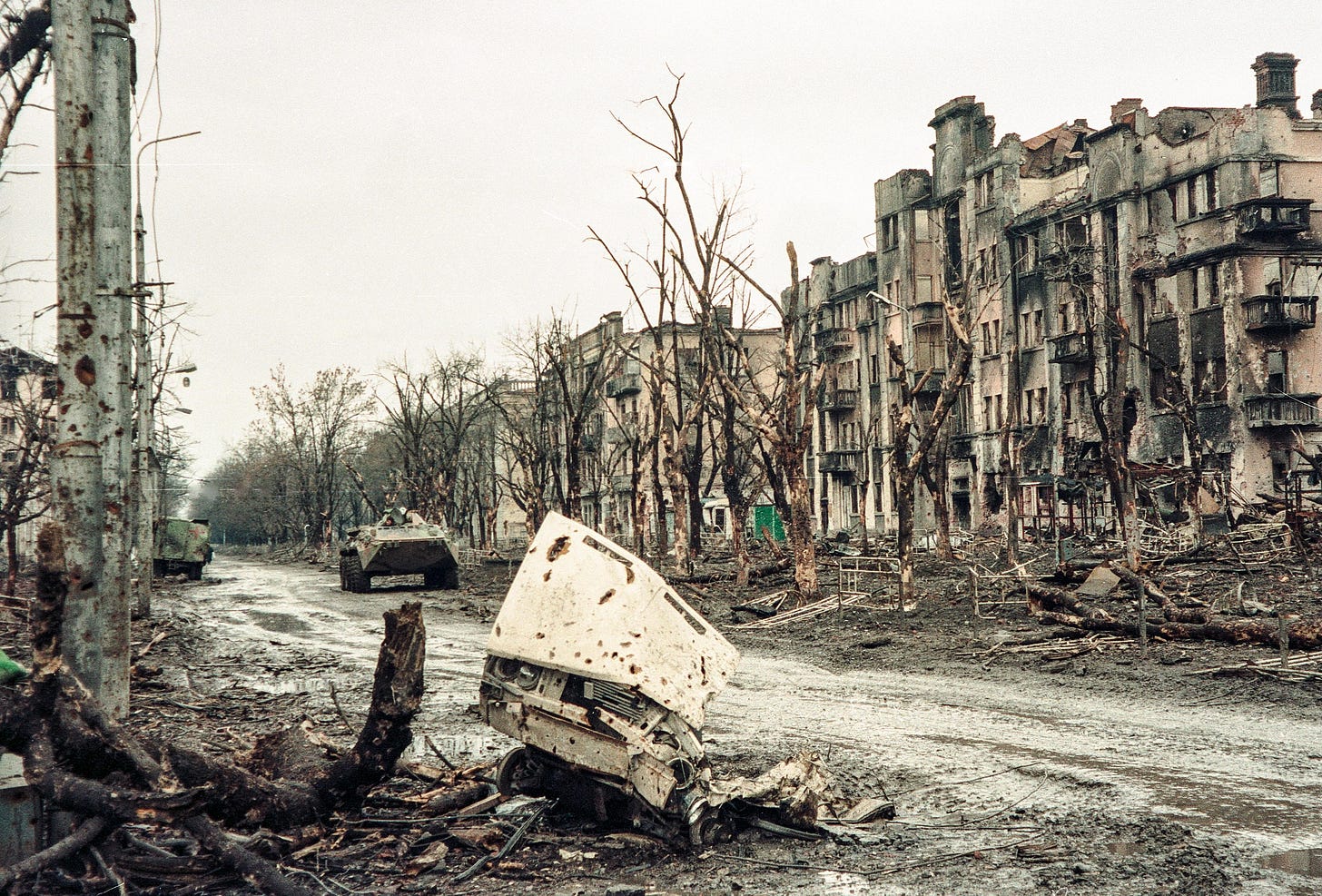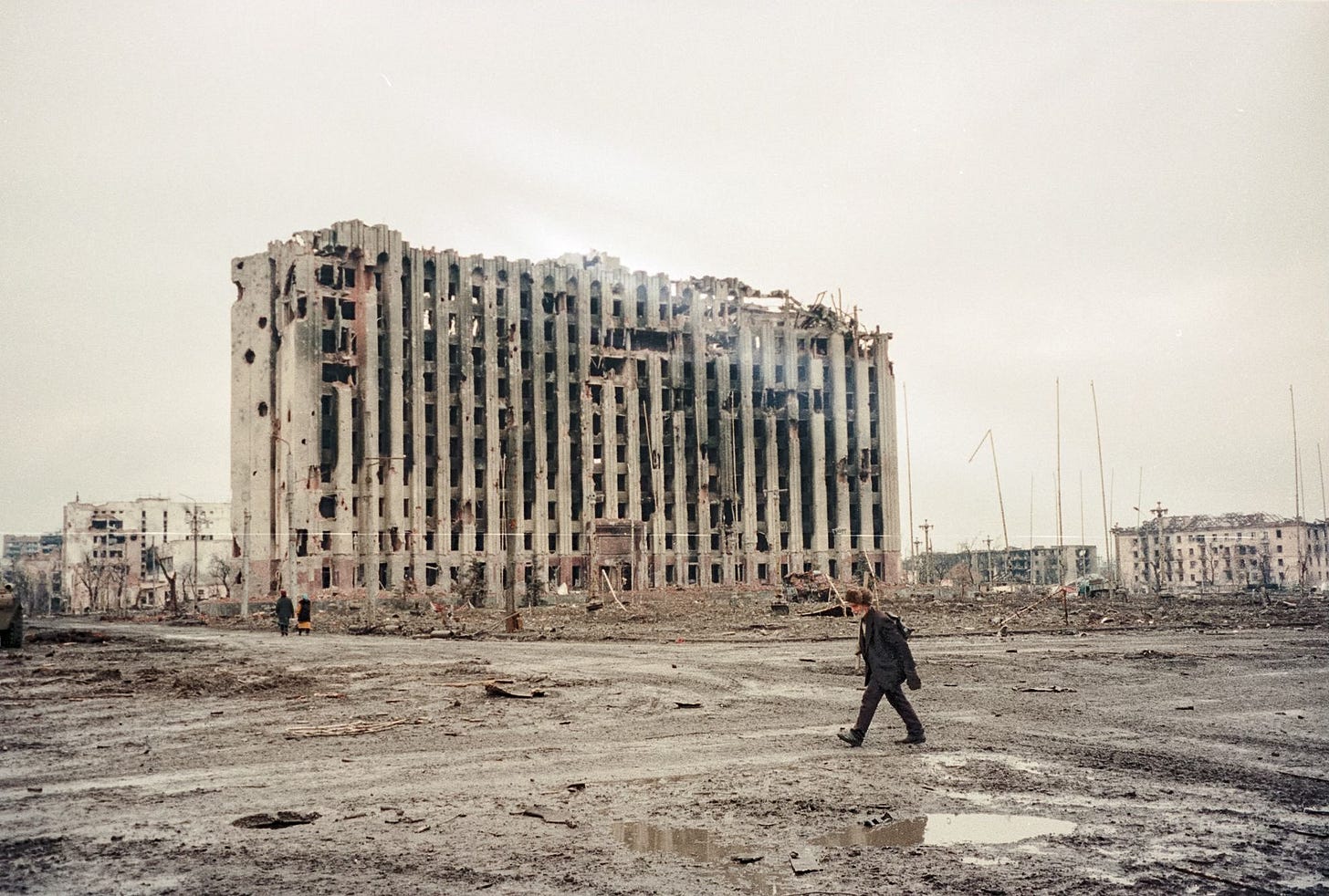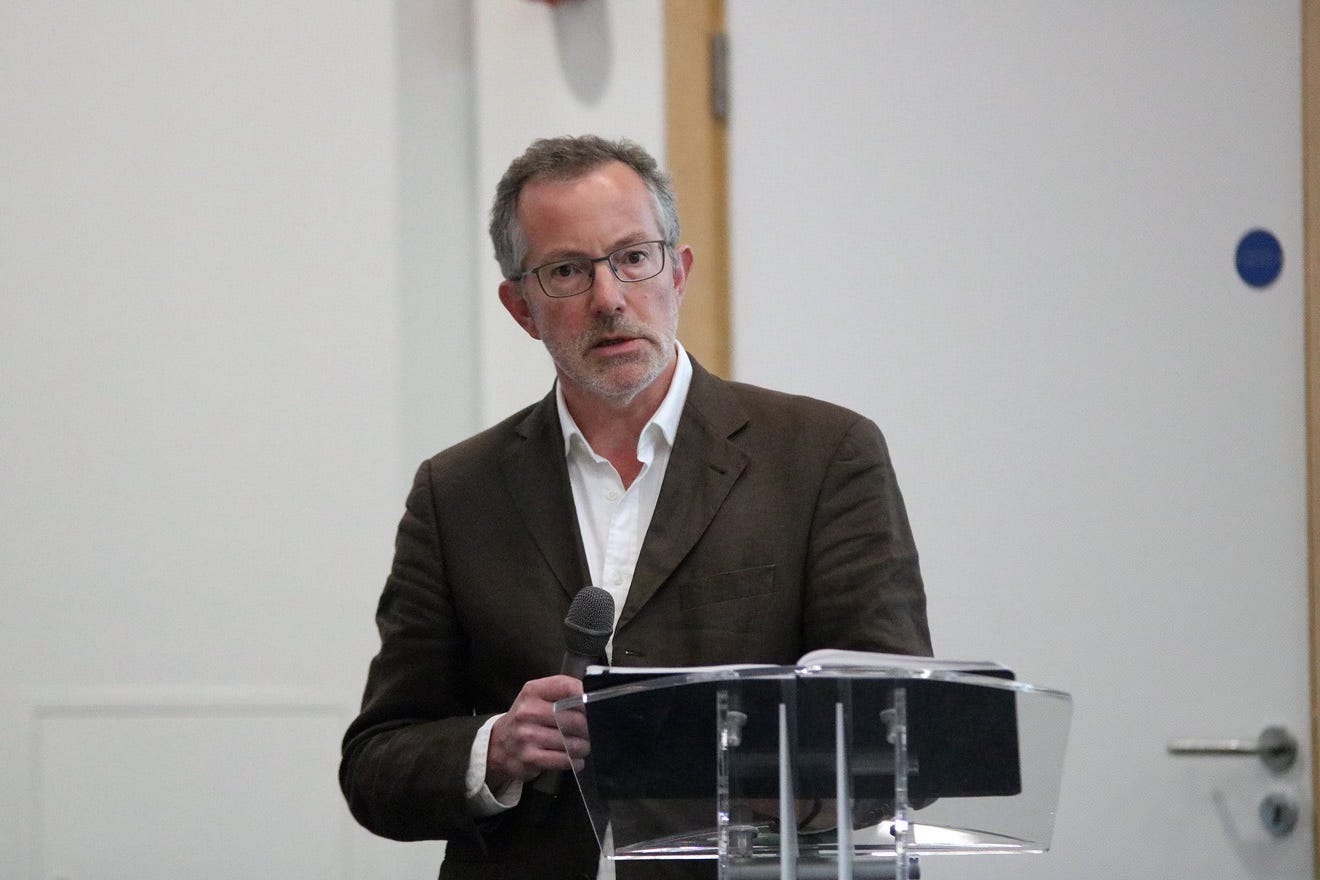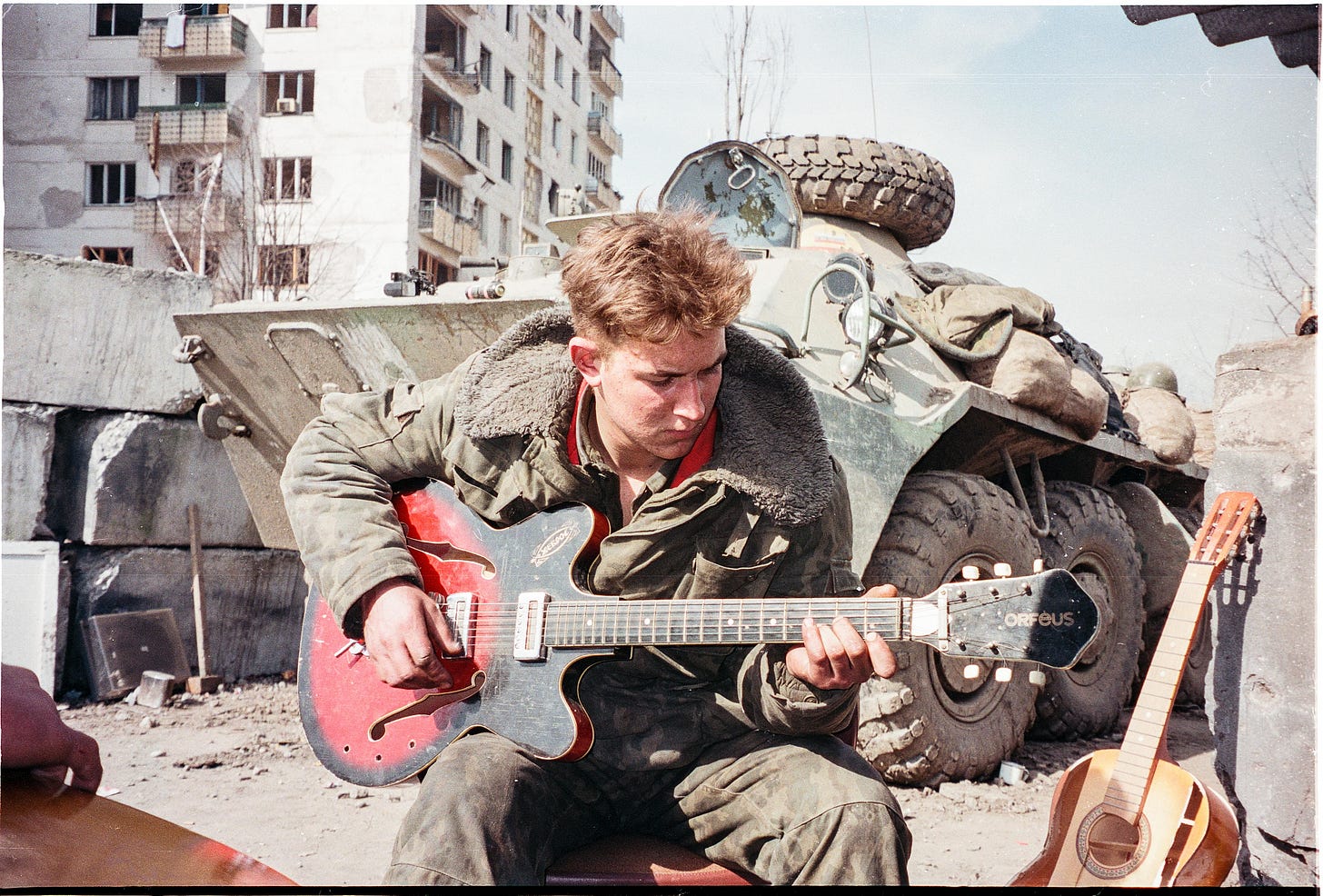On Friday, several hundred journalists and mental health professionals gathered in London for a ground-breaking conference on the effects of the job on one’s state of mind: MediaStrong. The focus was to move the industry from talking about the elephant that has been casually allowed to rampage around the room of news for decades, to doing something about it.
[Prospekt Mira - the Avenue of Peace - in central Grozny, early 1995. My photo]
Speakers included the BBC’s Jeremy Bowen and Allan Little, James Scurry, Leona O’Neill and Matt Green, along with many other highly experienced men and women. I was among the organisers.
One of my other tasks was introducing a panel of academics from City University in the afternoon. The topic was ethics, and especially the link between decisions made in haste, under pressure, in the field or in the newsroom, and the likely knock-on effects to physical and mental wellbeing – yours, of course, but also that of those on whom you are reporting.
I spent two decades in foreign news (as it was then known, rather than ‘world news’, as it is has been re-branded today), mostly based out of Moscow, but also for several years bearing responsibility for the BBC’s Baghdad bureau.
Wars in Chechnya, Kosovo, Afghanistan and Iraq, and revolutions (successful or gallantly attempted) in Moscow, Tbilisi, Belgrade and Kyiv presented the opportunity – the necessity – of making several dozen momentous decisions a day. So did natural disasters, political repression, terrorist attacks, victims of crimes, and the stories of those distressed or disabled by the vicissitudes of life in immiserated countries.
On the evening before the event, after meeting some of the conference speakers for dinner, I went back to my hotel room, jotted down some notes, ironed a fancy shirt I had kept from a spell of office employment, and prepared myself to man the PowerPoints, pass round a microphone, and at some point the next day, to say a few words.
In the end, I said more than I expected to. The urgency of so doing pushed itself upon me more strongly than fear of what shame I might feel afterwards in having revealed too much. (How much would be too much? I couldn’t tell, so I decided to gamble on articulating whatever came to mind at the time.)
What follows is a typed-up version of what I believe I said. It is based on the long-hand notes and bullet points I wrote the night before. The start was entirely improvised, so the first paragraphs here are only my best memory of how the speech began. There is a recording of MediaStrong 2024, but I have yet to see it and I am not yet brave enough to ask to do so.
Though that way, of course, I could ‘fact check’ myself, as it were.
Forgive unintended inaccuracies.
[The remains of the ‘Presidential Palace’ – Grozny, Chechnya, early 1995. My photo]
—
Good afternoon.
My name is Chris.
And I am not ‘resilient’ anymore.
I am very glad to be here. In two senses. First, it matters to me immensely that this conference is taking place and we are addressing a matter I feel strongly about. But second, I am just glad to be precisely here: as opposed to elsewhere entirely. Instead of being dead, say.
Or sectioned under the Mental Health Act in Fountain Way hospital in Salisbury in southwest England, which is how I spent the latter part of the past year – three decades since I first went to war.
For someone used to being in the driving seat of his life, being detained against my will was shocking. I thought it could not get worse – the denial of the freedom of movement I had taken for granted for 54 years. But it did get worse: my capacity was legally withdrawn, and I was deprived of the right not only to choose where to spend my days, but also of any control over what was done to my body. I was given high doses of strong medication and 12 courses of electro-convulsive therapy against my will.
The rights and wrongs of such treatment are not the point today. And it is not clear what role the experiences of my working life are directly responsible for in my state of mind in 2024. (But it seems at least plausible that the two matters are connected.)
[Photo credit: Brendan O’Neill]
Instead, I want to talk about a war some of you may not have heard of, and others may only vaguely remember. And which I cannot forget.
What keeps me awake at night is not the memory of shellfire, or the aftermath of a car bombing, or being mortared out of the ruins of a suburban apartment block, or of being strafed by a ground attack aircraft at a busy city roundabout, watching the afterburners of the twin departing jet engines after the rockets were launched. That is not what keeps me awake staring into the bedroom darkness. Instead, it’s the decisions I made which involved the wellbeing of others that prevent me from going back to sleep.
In Chechnya, in the early 90s, I was making dozens of momentous decisions each day. And aged 24, under direct fire from Russian soldiers, as well as metaphorical fire from editors in London because Reuters or Worldwide Television News had beaten us to a story (in those days I was working for Associated Press) I was very badly equipped to make them. I had little time and no experience. And yet not making a decision was not an option.
The weather was increasingly hot. The endless mud of spring in the North Caucasus had turned into the choking dust of summer almost overnight. I was at a checkpoint outside the village of Sernovodsk, just over the border with Ingushetia and into Chechnya. So were dozens of other journalists and aid agency workers. We had been trying to cross the checkpoint for several days. We smoked, chatted, and wheedled with the Russian troops manning the barrier to let us pass. They had not and would not, because they knew why we wanted to: it was rumoured that Interior Ministry special forces, high on drugs, had rampaged through the village, murdering civilians and burning down their houses.
They had done something similar a few days earlier in the neighbouring settlement of Samashki. Only Reuters had got in. The first I knew of their exclusive was a phone call from London asking if I could match it. Reuters had got footage of what is left from a massacre, and the spent hypodermic needles the troops had used to get in the mood for it. It caused an international uproar. I didn’t have a frame of the story.
I couldn’t let it happen again. You could fail once in news in those days, but preferably you wouldn’t allow yourself to do that, and you would certainly fail no more than once.
The day wore on, and the only vehicles crossing the checkpoint were armoured personnel carriers, throwing up clouds of dust that coated our camera lenses and clogged our hair. ‘What if I was in one of those?’ I thought.
Away from the crowd, I found the major in charge.
‘How much?’
‘How much have you got?’
Raised in Guildford to tell the truth and be a good boy, I instinctively told him:
‘$500.’
‘That will do. Go round the other side and get in.’
I looked through the toughened glass spyholes of the vehicle at the people milling at the checkpoint, among them the Reuters crew, and the Red Cross, and saw them stand aside as we raced past them and through the checkpoint.
Charred bodies of villagers were scattered here and there, and the houses were ruined, and we saw some syringes. Someone was sweeping up the mess of a home that could never be inhabited again: evidently when horror comes knocking, you feel the need to do something.
But I knew what we had wasn’t as good as the Reuters stuff from Samashki. And they had got pretty much the same story, and got it first. Inevitably, our video wouldn’t lead the news. It would be a NIB at best – ‘news in brief’, the montage of minor events in the middle of a bulletin. But the important thing was this: I hadn’t lost the game.
After we fed the edit to a satellite for distribution to AP’s clients, I had a beer in the bar of the Hotel Assa, a newly-built place funded by foreign journalists’ bills that already felt run down. A nice Australian lady from the Red Cross was sitting at the same counter.
‘Were you at the checkpoint again today? I thought I saw you, but then you disappeared.’
I told her, not without satisfaction, that I had been in Sernovodsk.
‘How???’
‘I bunged them some money and got a ride in an APC.’
My pride began to ebb in her shocked silence. It wasn’t envy forming in her eyes but anger.
‘You have fucked that checkpoint for all of us! How could you? Don’t you care? Is it all about you? How are we supposed to do our job now?’
Because I had paid money to the Russians, everyone else would now have to follow suit. Not just outside Sernovodsk, but perhaps at many other checkpoints in the country. We all handed out packs of Marlboro and kept bottles of vodka in the glovebox to be ‘confiscated’. But paying cash to cross had massively upped the ante. That was the realisation behind her outrage.
That night, I tried to rationalise my despair: the story needed to have been told, because nobody benefits, not even the Red Cross, if the truth doesn’t come out.
But that same night, and ever after, I realise this was a poor justification: I hadn’t been motivated by the desire to tell the truth so much as by the fear of being beaten, and a longing for the reflected glory of capturing suffering. That was the truth of it.
A Russian conscript playing a looted guitar at a checkpoint in the Chechen capital Grozny. [My photo]
It is in the nature of ethical decisions that they are difficult, and that there are few cast iron ‘correct’ answers to questions worth asking. As the French writer André Gide said, ‘Believe those who are seeking the truth. Doubt those who have found it.’
You may never know if you made the right decision. Yet you must live with it. Which is what I do, almost 30 years on. The best you will be able to say is that you gave it due consideration, putting the long term interests of others before your own short term needs. And only in that way can you truly help yourself.
‘Humankind cannot bear very much reality,’ wrote T.S. Eliot.
But as journalists, we expose ourselves to an awful lot of reality in order to convey just a tiny sliver of that reality to others.
Under extreme pressure of the moment, and at times facing direct threat to your body and your selfhood, it is very hard to give important, consequential decisions the consideration they demand of you. Journalism calls for the highest ethical standards. Yet at the same time, more often than you are prepared for, confounds your ability to sustain them.





I would be delighted if you shared it widely, Famil.
Once, during the Chechen war, on TV I saw a lonely little boy standing among the ruins of a residential building, desperately crying loudly and begging in Russian the operator with the words “дядя Пожалуйста заберите мне отсюда, заберите, пожалуйста.” Then I was a teenager, now I’m 43, a lot of time has passed since then, but this scene still haunts me...
Irakli